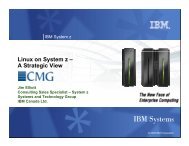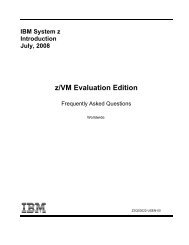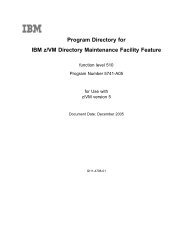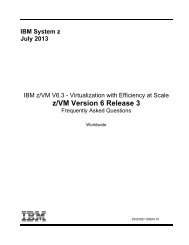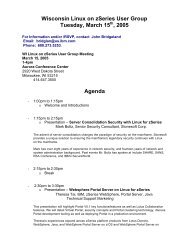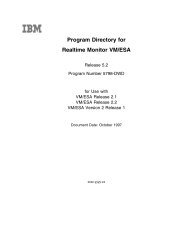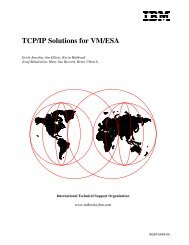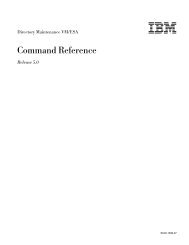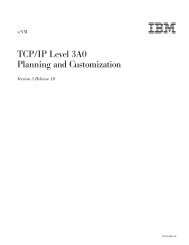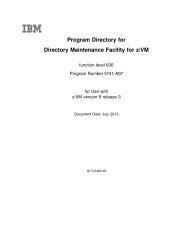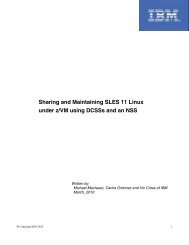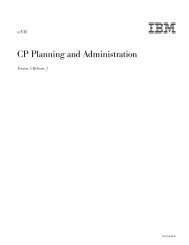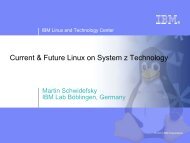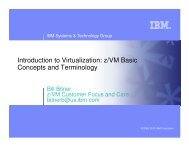Topic: Linux Certification Testing Topic: VSE ... - z/VM - IBM
Topic: Linux Certification Testing Topic: VSE ... - z/VM - IBM
Topic: Linux Certification Testing Topic: VSE ... - z/VM - IBM
Create successful ePaper yourself
Turn your PDF publications into a flip-book with our unique Google optimized e-Paper software.
Performance tuning DB2 Server for <strong>VSE</strong> & <strong>VM</strong> can be more art than science. Frank Fillmore has over 14 yearsexperience troubleshooting and tuning SQL/DS and DB2 databases in decision support and transaction processingenvironments. Hear about real world challenges and solutions. Come armed with your toughest performance problems.Session: U05Title: TXSeries OverviewSpeaker: Chris Smith, <strong>IBM</strong>Abstract:Would you like to use your existing skills to a distributed environment? Did you know that CICS-like functionality isavailable on a variety of platforms?TXSeries V5 is available on Windows 2000, WindowsNT, and AIX, supporting popular database managers, includingDB2, Oracle, Informix, Sybase and SQL Server, MQSeries messaging software, and programming languages includingC, C++, COBOL, and PL/I. Note: this session starts at 8:15 AM on Wednesday, so please grab some breakfast andcome on up.<strong>Topic</strong>: Virtualization Technology for <strong>Linux</strong> on zSeries & S/390 SessionsSession: V10Title: Automating <strong>Linux</strong> for S/390 using the <strong>VM</strong> Programmable OperatorSpeaker: David Boyes, Sine Nomine AssociatesAbstract:One of the fantastic benefits of running <strong>Linux</strong> under <strong>VM</strong> is the availability of a sophisticated programmable operationsfacility that can monitor <strong>Linux</strong> console and syslog output and respond intelligently to messages and queries posted byliterally thousands of <strong>Linux</strong> instances. This session will describe a set of <strong>Linux</strong> automation tools that form a frameworkfor handling common console and user problems, do availability testing and application availability monitoring, andprovide rudimentary security scanning for a farm of nearly 10,000 virtual <strong>Linux</strong> systems in production. Come see howto use <strong>VM</strong>'s best features to also drive events on other systems as well -- we'll also present a prototype of a distributedconsole monitoring tool that provides PROP-based control of AIX, Solaris, and SGI systems integrated with a <strong>Linux</strong> forS/390 environment.Session: V16Title: LPAR vs. <strong>VM</strong> Preferred GuestsSpeaker: Romney White, <strong>IBM</strong>Abstract:In non-<strong>VM</strong> installations, hardware Logical Partitioning (LPAR) support is widely viewed as an alternative to <strong>VM</strong>/ESAMultiple Preferred Guest (MPG) facilities. However, <strong>VM</strong> aficionados know that there must be a catch, since <strong>VM</strong> offersso much more. In fact, as this session explains, running <strong>VM</strong> in an LPAR can even be a viable configuration option.Because LPAR and MPG are based on many of the same technologies and concepts, it isn't surprising that they areoften compared and sometimes confused. In this session, we try to present a factual comparison of LPAR and MPG,with an eye to helping customers decide which solution is the right one for them.



